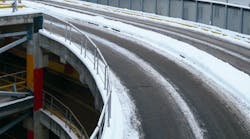Parking structures come with their own set of challenges. They’re constantly exposed to the elements, which can make it tough to keep up with regular maintenance.
Vehicles that enter and exit often leave behind such debris as oil and dirt. And if a structure you manage is located in an area subject to winter weather, snow, salt and de-icers can be damaging. Winter weather can wreak havoc on a parking structure, from increasing the risk of slip-and-fall incidents to using de-icers that corrode the structure’s steel components.
It’s important to get ahead of the potential damage before you’re stuck with costly repairs or restorations.
4 Biggest Winter Weather Liabilities
When assessing potential pain points within your parking structure as you prepare for winter weather, these liabilities are what you should be most cautious of:
1. Slip-and-fall injuries
“Probably the biggest liability we see from our clients are slip-and-fall injuries that occur in their structure during the winter,” says Dan Moser, vice president and director of restoration for Walker Consultants, a parking design and consulting firm.
“Slips and falls usually come from lack of proper de-icing—the presence of snow and ice where people are parking their cars and walking.”
2. Damaging de-icers
De-icers that contain calcium chloride are known in the long run to cause corrosion on embedded steel items within parking structures. But, Moser says, the reality is that they’re still commonly used.
“There’s nothing that de-ices as effectively and as cheaply as calcium chloride de-icers,” he explains. “It would be hard for me to recommend that [facilities managers/building owners] use it, but it’s a reality, and we understand that most owners are going to use that.”
3. Improper snow removal
“You can easily hire a lot of different [snow removal] companies that will claim to use all kinds of good snow removal techniques,” Moser says. “But you need to understand exactly what they’re going to do to remove snow off the top level.”
Are they piling 16 feet of snow at a time? That’s a red flag.
“There have been portions of parking structures that have collapsed from piled snow,” Moser says. “Parking structures are not designed to resist that.” The structure’s expansion joints can also be easily damaged by steel snow plow blades. “They can catch it and actually rip it out of the structure,” Moser says.
4. Clogged drains
Rain mixed with melting snow might not be able to escape your structure because of a clogged drainage system. “It’s easy to get a lot of debris in a drainage system if you’re not regularly cleaning it,” Moser explains. “That prevents proper drainage. You’ve got water sitting on top of the slab that freezes, so you’re using a lot more de-icing chemicals to deal with frozen ponded water.”
4 Damage Prevention Tips
1. If using a de-icer, know the damage it can cause.
Western Specialty Contractors, specialty contractors in masonry, concrete, waterproofing and façade restoration, recommends only using de-icers that are approved by the American Concrete Institute. In general, the company says, the use of deicing chemicals isn’t recommended. They can lead to serious concrete deterioration and corrosion in reinforcing steel and other metals.
Hydronic Snow & Ice Melting Systems for Buildings
Learn how these systems can work with you during winter to benefit your building. Listen now >>
2. Have the structure evaluated by an experienced engineer.
They can identify areas of the parking structure that might need repairs or proper waterproofing done before winter weather hits.
“If you have expansion joints that are leaking, you’re going to go through winter and let saltwater leak through those joints,” Moser says. “Then you’ll find elements of parking structure slab that corrode and just cause expensive repairs later. But if you have someone that can identify all that in an objective way, that goes a long way for preventative maintenance.”
3. Implement proper training for snow removal contractors.
Use rubber-tipped steel blades at a proper angle, to protect those expansion joints and sealant joints from being caught or ripped out of the slab. Don’t pile snow. Those piles can cause cracking and even collapse.
“As they’re plowing, they should be getting it off the structure at the same time without having to pile it anywhere,” Moser says.
4. Clean and inspect your drains before winter hits.
Moser recommends regular wash downs of the structure: once in the spring, and then once in the fall to remove dirt and other debris that accumulated over the summer.
“Get the slab nice and clean so that during the winter, water can flow off of the surface of the slab, into the drainage system and be taken away,” he adds. “Standing water can really cause a lot of damage.”
Being aware of the biggest winter weather liabilities—and how to prevent them—can not only help you avoid costly repairs, it can extend the life of your parking structure. And, most importantly, it can keep your tenants safer.
Two handpicked articles to read next:



